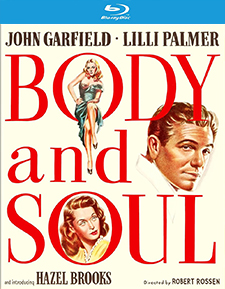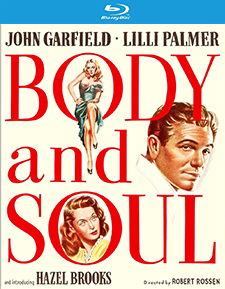Body and Soul (Blu-ray Review)

Director
Robert RossenRelease Date(s)
1947 (October 1, 2024)Studio(s)
United Artists (Kino Lorber Studio Classics)- Film/Program Grade: A
- Video Grade: A
- Audio Grade: B+
- Extras Grade: B+
Review
Boxing movies have the benefit of built-in action sequences along with their dramatic stories. In 1947, Body and Soul established the template for future boxing movies, such as Requiem for a Heavyweight, Rocky, Raging Bull, and Cinderella Man. A young man from modest beginnings, lured into professional boxing by the promise of fame and fortune, finds his morality coming into conflict with his ambition.
Charley Davis (John Garfield, The Postman Always Rings Twice) comes from the “other side of the tracks,” where his mother (Anne Revere, National Velvet) and father (Art Smith, Brute Force) run a candy shop that provides a modest living. Charley’s proficient in the boxing ring and feels he’s good enough to compete professionally, but his mother wants him to go to night school to prepare himself for a respectable career.
Charley wins an amateur match and part of his prize is a dance with a pretty girl, Peg (Lilli Palmer, Cloak and Dagger). Charley is smitten, and though Peg initially resists, she eventually succumbs to his persistence and charm. He tries to make it in the boxing game but it’s tough, and the big fights—where the money is—are controlled by shady characters. With the support of best pal Shorty (Joseph Pevney, Nocturne), Charley connects with small-time promoter Quinn (William Conrad, Cry Danger).
As the wins and the money increase, Charley drops Quinn and teams up with promoter Roberts (Lloyd Gough, All My Sons). This new promoter has special demands but offers more lucrative bouts. Charley also gets taken in by the not-so-subtle charms of nightclub singer Alice (Hazel Brooks. Sleep My Love). The payoffs get bigger and things look good for a while. But Charley has jumbled his priorities and alienated Peg, his mother, and Shorty by compromising his integrity. Now he must deal with his inner conflict and decide whether to recover his moral compass, do the right thing, and try to regain his self-respect and the respect of his loved ones.
Director Robert Rossen provides a gritty look at the corrupt side of professional boxing, the shady characters who inhabit that world, and the lure of fast cash that makes boxing so enticing. Charley feels the only thing he’s good at is boxing. His ability to turn that talent into money can lift his parents and himself out of poverty, so his motive for fighting is admirable. Though the people who care for him warn him against the manipulators and fast-talkers, he goes along for the ride, only to discover he has sacrificed more than he’s gained. For much of the film, Charley is controlled by others until, finally, he determines his own course of action. From naive, wide-eyed hopeful, he navigates a cynical path until he sees that there’s a heavy trade-off for monetary riches.
Garfield is excellent as Charley. The opening scene finds him sleepless and restless on the verge of an important fight. As he lies in bed, Garfield’s expression reveals not only Charley’s nervousness, but also his misgivings as he reassesses how he got the chance at a championship fight. Later, when it’s revealed that Charley betrayed Shorty, Garfield registers a combination of embarrassment and hurt. His scenes with Revere, who plays Charley’s mother, have authenticity as he listens to her advice and tries to comply with her wishes.
Palmer and Brooks as the two young women in Charley’s life embody his moral tug of war, one looking out for his safety and happiness, the other looking only toward what money can buy. Gough is appropriately smarmy as the crooked promoter who presents himself as caring and wise but only sees Charley as a cash cow. Pevney’s Shorty is the voice of reason who recognizes the dangers of falling in with questionable people and wants the best for his longtime buddy. Revere, who made a career as a character actress playing mothers, is strong-willed yet loving as Mrs. Davis. Observant, spare with words, and honest, she’s wary of a world that promises big, fast bucks because she’s always had to work long and hard for a living.
Body and Soul is both a gripping drama and a morality tale. The Abraham Polonsky screenplay presents colorful characters and a number of scenes in which Charley’s integrity is tested by temptation. Director Rossen elicits first-rate performances and establishes a palpable milieu. The film holds up well, with a number of elements recognizable in later fight films. The boxing scenes are exciting and enhance a film that’s more drama than sports picture, since the focus is on how Charley recognizes what matters most in life.
Body and Soul was shot by director of photography James Wong Howe on 35 mm black & white film with spherical lenses, finished photochemically, and presented in the aspect ratio of 1.37:1. The Blu-ray from Kino Lorber Studio Classics is from a 2021 HD master by Paramount Pictures from a 4K scan. Contrast and clarity are very good, with no perceptible imperfections. Shadows from tree branches fall across Charley’s face when he’s lying in bed early in the film. Much of the climactic fight is filmed from low angles, providing a ringside view. Street scenes are obviously shot on a studio backlot and dressed to look seedy, with papers blowing around in the wind. Rear projection is used for a scene in which Charley drives.
The soundtrack is English 2.0 mono DTS-HD Master Audio. English SDH subtitles are an option. Dialogue is clear and distinct but there’s some muddiness during the fight scenes, with sound effects and ambient crowd noise coming off as an audio blur. Sound effects include body blows and grunts during the fight sequences, car engines, and cheering fight crowds. The score by Hugo Friedhofer ranges from romantic to foreboding to intense, depending on the scene. The song Body and Soul by Johnny Green is incorporated as a romantic motif for Charley and Peg. Hazel Brooks sings Am I Blue? in a nightclub setting.
Bonus materials on the Region A Blu-ray release from Kino Lorber Studio Classics include the following:
- Audio Commentary by Alan K. Rode
- Force of Evil Trailer (1:33)
- He Ran All the Way Trailer (2:14)
- World in My Corner Trailer (2:14)
- The Counterfeit Traitor Trailer (3:23)
- They Came to Cordura Trailer (2:36)
Audio Commentary – Author and film historian Alan K. Rode refers to Body and Soul as a “casting call for the Black List,” since so many of the people associated with the film were blacklisted during the HUAC investigations. He gives a brief history of Enterprise Pictures. The studio received a $10 million loan from Bank of America to finance its first six films. John Garfield had a contract with Enterprise that gave him script and salary approval. The studio was a magnet in 1946 for other stars, such as Charles Boyer, Ginger Rogers, Ingrid Bergman, and Joan Crawford. “Everyone came there to make independent films." Career overviews are provided for Garfield, Lilli Palmer, and some of the supporting players. Garfield was born into poverty, his mother died when he was a boy, and he became a street kid. When his father remarried, Garfield didn’t get along with his stepmother, dropped out of school, and applied to the American Laboratory Theater. His career at Warner Bros. flourished with films like Juarez, Humoresque, Out of the Fog and The Sea Wolf. Garfield worked with a former boxing champion to get into shape for Body and Soul. Lilli Palmer was a German Jew who fled Nazi Germany. In the film, her Peg isn’t like the neighborhood girls. She represents possibilities for Charley. Body and Soul was Palmer’s first hit. The character of Roberts is based on a real-life mafia figure in the boxing world. The film was originally going to be a biopic about Jewish boxer Barney Ross, who turned his back on his religion to become a prizefighter. Rossen, the director, wasn’t well liked because he cooperated with HUAC and named names to save his own career. He shot “miles of film” because he couldn’t reign in director of photography James Wong Howe, who would stop a shot for even a minor problem with lighting. Two endings were shot and each was tested with an audience—the one that’s in the film and one in which Charley winds up dead near trash cans. The film cost $1.8 million and grossed $5 million.
Body and Soul is a highly dramatic, well-acted picture. With a cast headed by John Garfield, the film explores relationships threatened by the pursuit of fast money. It portrays the hustlers and parasites who attach themselves to naive individuals as a means to rake in bundles of cash, regardless of how immoral and sometimes illegal their methods might be. In fact, there’s almost an anti-money subtext about how large sums can corrupt and destroy. Ultimately, however, the film is an optimistic portrayal of how decency triumphs over baser instincts.
- Dennis Seuling

